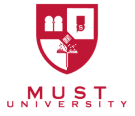Dual Master in Data Science & Artificial Intelligence
Language
Duration
Level
Approach
Students must be holders of a Licence or Bachelor degree in computer science, computer engineering, electrical engineering, or a related field.
The Dual Master’s Program in Data Science and Artificial Intelligence is a two-year international track that leads to two graduate degrees:
- A Master of Science (MS) in Data Science from MUST University, and
- A Master of Arts (MA) in Data Analytics and AI from Steinbeis S-Next, affiliated with Steinbeis University, one of Germany’s most prominent institutions for applied research and industry-linked education.
Designed for ambitious students seeking a global, interdisciplinary, and career-ready academic experience, the program offers a unique opportunity to gain expertise across two continents and two complementary academic cultures.
Students spend the first academic year (two semesters) at MUST University, where they build a solid foundation in data science, including machine learning, data engineering, statistics, and applied research methods. In the second year, students transition to Steinbeis S-Next, where they deepen their specialization in data analytics and artificial intelligence, with a strong emphasis on business applications, entrepreneurship, and innovation management.
At MUST University, students benefit from:
- Rigorous technical training spanning mathematical foundations of data science, Big Data analytics, Machine Learning, Data management and data engineering,
- Unlimited Certifications via MUST’s Digital Campus which includes over 8 thousand courses from Coursera for Campus, NVIDIA’s Deep Learning Institute, Amazon AWS online academy, and DataCamp,
- Professors with international experience,
- A vibrant campus community and extended international network of partners and adjunct faculty,
At Steinbeis S-Next, students benefit from:
- A curriculum grounded in real-world problem-solving,
- Extensive interaction with industry partners and innovation labs,
- Access to career networks in Germany and the EU, and
- The option to complete the year either online or in person at the Steinbeis campus in Germany.
The specific objectives of the master program in data science include providing our graduates with:
- A solid foundation in data science concepts, techniques, technologies, and tools.
- A solid foundation in the statistical and mathematical foundations of data science.
- An in-depth understanding of the challenges of developing and managing data analytics solutions and their risks and implications.
Graduates of the Master program can continue their education to get a PhD in a related field. They can also join the industry to lead data science projects or to develop and manage data analytics solutions for a variety of applications. Graduates can also join multi-disciplinary teams to launch a startup to develop solutions relying on these technologies to serve the needs of clients in a variety of sectors.
Specific potential careers include:
- Data scientist.
- Data analyst / Business analytics consultant.
- Data engineer.
- Research & development engineer in data mining and knowledge extraction.
- Consultant in information-intensive industries.
- Designer of specialized software solutions for the processing & analysis of large amounts of data.
- Project manager in data-analysis industries.
A few years after successfully completing the Master’s degree in “Data Science”, graduates shall be:
- Employed in industry and demonstrating career advancement through leadership responsibility, significant technical achievement, or other recognition of their contributions.
- Continuing their formal education towards a graduate degree or other professional certification in the field or leading their own technology venture.
- Applying gained knowledge and expertise to develop data science (data collection, analysis, and learning) solutions and applications.
- Working as data analysts, scientists, engineers, consultants in data analytics and business intelligence, research engineers, or information system and data analytics system architects, designers, and managers.
- Demonstrating an in-depth understanding of the challenges faced by industry and society in data analysis.
Steinbeis is a global network specializing in knowledge and technology transfer, supporting businesses, research institutions, and professionals through applied research, consulting, and education. It is recognized for bridging the gap between academia and industry by fostering innovation and entrepreneurial initiatives. Steinbeis University is part of this network and focuses on business, technology, and innovation management. Its programs emphasize a project-based learning approach, enabling students to work on real-world challenges in close collaboration with industry partners. All Master’s programs at Steinbeis University are delivered entirely in English.
Within Steinbeis University, the Steinbeis Schools of Next Practices (S-Next) is dedicated to executive education, with a focus on leadership, digital transformation, and business innovation. It has a variety of MA, MS, and MBA programs which can provide an excellent continuation after an undergraduate degree at MUST. More on these programs can be found via this link.
Participants in this program benefit from a 30% reduction in tuition fees at Steinbeis S-Next, and can study either in Germany or online remotely from Tunis. Students receive academic support and career advising throughout their studies. Students who successfully complete this program earn two degrees, one from MUST University and another from Steinbies S-Next.
| Course Code | Course Title | UE | ||
| CS 482 | Mathematical foundations of data science | UE 1 | ||
| CS 435 | Big data technologies & applications | UE 2 | ||
| CS 431 | Data management for data scientists | UE 3 | ||
| COM 425 | Advanced technical communication | UET 4 | ||
| CS 521 | Software engineering for data scientists | UEO 5 |
| Course Code | Course Title | UE | ||
| CS 483 | Machine Learning | UE 6 | ||
| CS 535 | Scalable big data processing | UE 7 | ||
| CS 451 | Distributed systems | UE 8 | ||
| COM 435 | Effective professional presentations | UET 9 | ||
| CS 470 | Data visualization for data scientists | UEO 10 |
| Course Code | Course Title | UE | ||
| CS 585 | Deep learning and neural networks | UE 11 | ||
| CS 555 | Cloud computing for data scientists | UE 12 | ||
| CS 581 | Generative AI and large language models | UE 13 | ||
| PHIL 222 | Contemporary issues in Data ethics | UET 14 | ||
| CS 586 | AI for emerging applications | UEO 15 |
| Course Code | Course Title | UE | ||
| ISS 521 | Master Thesis/Project (Mémoire de Stage de fin d’études) | UEF 16 |

